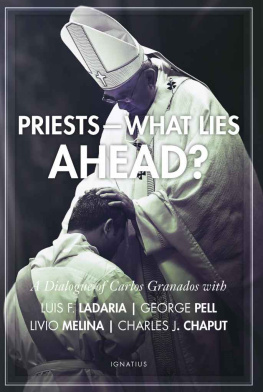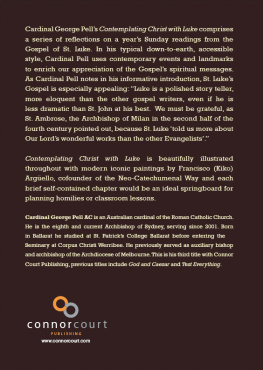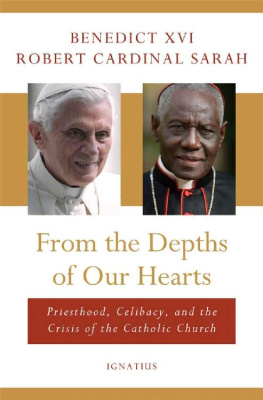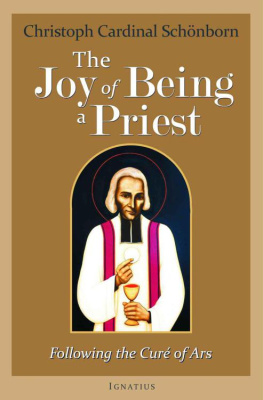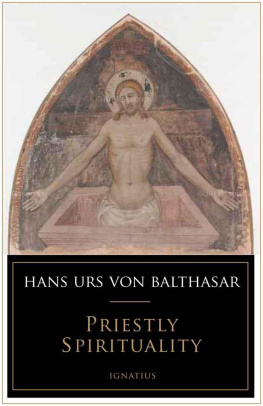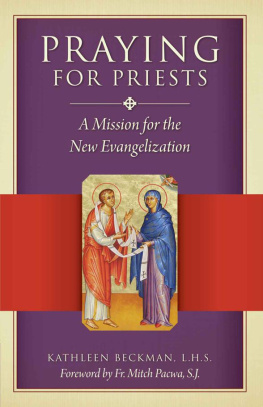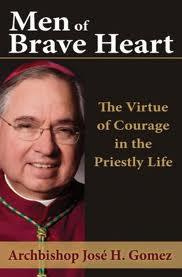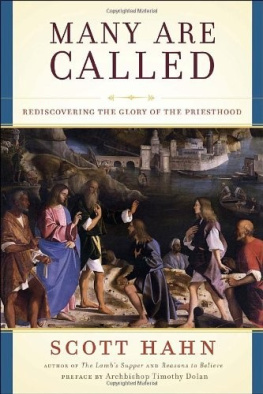PRIESTSWHAT LIES AHEAD?
PRIESTS
WHAT
LIES AHEAD?
A Dialogue of Carlos Granados with
Luis F. Ladaria, George Pell,
Livio Melina, and Charles J. Chaput
Translated by Richard Goodyear
IGNATIUS PRESS SAN FRANCISCO
Original Spanish edition:
Sacerdotes, icon qu futuro?
2016 Biblioteca de Autores Cristianos, Madrid
Unless otherwise indicated, Scripture quotations are from Revised Standard Version of the BibleSecond Catholic Edition (Ignatius Edition) copyright
2006 National Council of the Churches of Christ in the United States of America. Used by permission.
All rights reserved worldwide.
Cover photograph by Stefano Spaziani
Cover design by Enrique J. Aguilar
2018 by Ignatius Press, San Francisco
All rights reserved
ISBN 978-1-64229-042-4 (EB)
ISBN 978-1-62164-196-4 (PB)
Library of Congress Control Number 2017932954
Printed in the United States of America
CONTENTS
PREFACE
I would like, in these few words, simply to describe how this book came to be. It originated in an intuition that, in the changes that our society and the Church are undergoing, we can discern the potential for a new fruitfulness for the priest. And he will be able to realize that potential if he roots himself in what he is: teacher, father, physician, and pastor. These are four images of the Only Priest, of Christ the Lord, who is the true Teacher, Father, Physician, and Pastor.
In order to examine those images closely, I have chosen four priests, great exemplars, who speak with the authority of their experience and of the impressive fruitfulness of their lives. The literary genre of a conversation or interview is always an occasion for lively and dynamic elaboration: it enables us to give voice to concerns and questions that might be out of place in a magisterial exposition. But it was also a matter of offering in this way a more lively and direct witness, in familiar language, to pose questions about hope to these especially prominent priests. They explain to us in this book what makes the priests life great and beautiful, as teacher, father, physician, and pastor.
The priest is a teacher. To understand this very important aspect of the life of an ordained minister, I turned to Archbishop Luis Ladaria, S.J., whom I had the good fortune to interview where he works, at the very seat of the Congregation for the Doctrine of the Faith in Rome. As a true teacher, Archbishop Luis Ladaria is calm and hardworking. In an extremely cordial tonewhich is habitual in himthe interview proceeded briskly, without digressing or wasting time.
Pope Benedict XVI named him Secretary of the Congregation for the Doctrine of the Faith, with the rank of archbishop, on July 9, 2008. He had worked for years in the Congregation as a consultor and also as a member of the International Theological Commission. But above all he had spent his whole life teaching, in Madrid at Comillas Pontifical University or, in the last few decades, in Rome at the Pontifical Gregorian University. Father Ladaria has the soul of a professor. He is known at the Gregorian University for the high academic level and great clarity of his lectures, which he gave as someone who knows he is truly the parish priest of his students. He is, therefore, as the reader will see, the right person to illuminate for us the fruitfulness of the priest as teacher.
The priest is a father: he propagates through the sacraments. The dialogue with Cardinal Pell addresses precisely this dimension. George Pell is the Cardinal Prefect of the Vatican Secretariat for the Economy, and he was for many years metropolitan archbishop of Melbourne and Sydney. His ordination as a priest was fifty years ago now, and he has lost none of his passion as a father.
I had the good fortune to interview him in Rome, in his personal residence. It was a day full of questions and with answers in English. Cardinal Pells conversation is calm and unhurried, but with a fine economy of expression. His library is that of a scholar, educated in Rome and at Oxford. He has the demeanor of a pastor who is concerned about the specific real-world problems of the Church. He has the mind of a practical person; it is fitting that the economic affairs of the Holy See are his area of responsibility. And he has the heart of a father, focused on opening up the future.
The time flew by. His answers were very pleasing. The cardinal had prepared for the questions and even delivered to the interviewer a supplementary bibliography to bridge any gaps that he might have left. Yes, Cardinal Pell has lived a true fatherhood as a priest in these fifty years of ministry: his selection for this book could not have been better.
The priest is also a physician: he heals wounds, he cures, like the Good Samaritan, and he brings his neighbor back to the inn that is the Church. To help us understand this aspect of priestly life, few priests can speak to us with as much knowledge and experience as Monsignor Livio Melina. Professor Melina holds the Chair in Moral Theology at the Pontifical John Paul II Institute for Studies on Marriage and Family, and at the time of the interview was its president. He is more than just erudite, in the highest sense of the word: he is also outstanding in his knowledge of the human heart, thanks to his ample experience as a pastor and confessor. He has taught generations of priests and was one of the founders of a broad pastoral movement in support of families.
I was fortunate enough to interview him at the seat of the Pontifical John Paul II Institute in Rome, in the Lateran. There I was able to speak with him for an entire day, at a pace that was nothing if not intense. If there is anything surprising about Don Livio Melinaand in this he very much reminds one of the pope emeritus, Benedict XVIit is his ability to fashion a statement that is seamlessly woven together, transparent, intelligent, original, full of hope. Our interview reveals the heart of a physician, of one who shares in the Passion of Christ, of the wounded surgeon, who heals us precisely through his own wounds, in the image of the Anglo-American poet T. S. Eliot.
Finally, the priest is a pastor. To cover this aspect of the figure of a priest, I decided to fly to Philadelphia to talk with Archbishop Charles J. Chaput of that American diocese. The expectations I had formed from what I had heard about his virtues and gifts were not disappointed. The reader will be able to judge for himself. Archbishop Chaput was born into a Native American family. His grandmother lived on a reservation, and he became a member of the tribe as well. He was at first a Capuchin friar, entering holy orders; he later was named bishop of Rapid City, then of Denver, and now of Philadelphia. Archbishop Chaput is a fine priest, with all the experience of life and wisdom acquired over many years. He is a pastor from head to toe, with the proverbial prudence of a wise tribal chief, a deep knowledge of the human heart, and wide-ranging interests.
He received me in the diocesan seminary, where he himself lives. We had our discussion there, in peace and quiet. His manner is direct, clear, concise. His eyes shine in a particular way, even sparkling with singular life at certain points in the conversation. Leaning back informally in an armchair, he not only invites confidence; he almost invites confidences. Archbishop Chaput is a direct, accessible man of great humanity and a profound sense of the divine. He thus has shown himself to be a matchless priest for talking with us about this pastoral aspect of the ministry.
This completes the description of some aspects of the shape and genesis of the book. All that remains (last but not least) is to mention the warm and gracious foreword by Cardinal Mller, Prefect of the Congregation for the Doctrine of the Faith, who has been kind enough to lend words of his own to this book. They are also the words of an experienced priest, of a teacher and father, of a true physician and seasoned pastor. They make a magnificent portal to the reflections of his brothers in the priesthood. The interviews gathered here, preceded by the cardinals foreword, have been arranged in the chronological order in which they were conducted, as was dictated by various surrounding circumstances.
Next page
